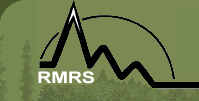|
Rocky Mountain Research Station Home
>
Science Program
Areas > Air, Water and Aquatics > Fire
and Aquatic Ecosystems Workshop
Fire and Aquatic Ecosystems
Workshop

Fire & Aquatic Ecosystems II
March 12, 2009
Owyhee Plaza Hotel, Boise,
Idaho
workshop
Introduction
In the first decade of the 21st
century wildland fire issues dominate the management of many public
lands in the West. It seems new evidence emerges on a daily basis
suggesting the challenges posed by wildland fire are likely to be
compounded by the effects of climate change. Wildland fire burns
vegetation and alters the landscape but aquatic systems may also be
profoundly affected by the direct and indirect effects of fire. The
interaction of wildland fire and aquatic systems was the subject of the
first Fire and Aquatic Ecosystems Workshop in 2002. There is a need for
an updated review and synthesis of how fire affects aquatic ecosystems,
how it interacts with land, fuel, and fire management decisions, and how
a changing climate alters the template on which these interactions occur
and decisions are made.
The purpose of this workshop is to discuss
how to bring the available science into everyday use for decision making. To do
this, we will step past the technical details and guidelines into a broader
discussion of the interdisciplinary setting in which decisions of this nature
must be made. We will discuss how the science can best be synthesized and
packaged to support policy updates, to feed decision tools, and efficiently
inform discussions with stakeholders. Some presentation is needed to frame the
issues, but much of the workshop is devoted to discussion and interaction to
promote conversations between decision makers and scientists.
A copy of
the funded project proposal can be
viewed here.
Who
Should Attend?
Our primary audience is line officers and
their support staff who rely on scientific information to make the best
decisions when it comes to managing wildland fire and natural resources situated
within areas where wildland fire hazards are great. Recent investigations of
wildland fire and related processes suggest fundamental changes to the way
wildland fire is managed in western forests could be beneficial to both the
resource and stakeholders. Therefore, officers responsible for crafting policy
at the agency level will be valuable participants.
top
workshop
Topics and Contacts
For
more information on the project contact
Charlie Luce
|














